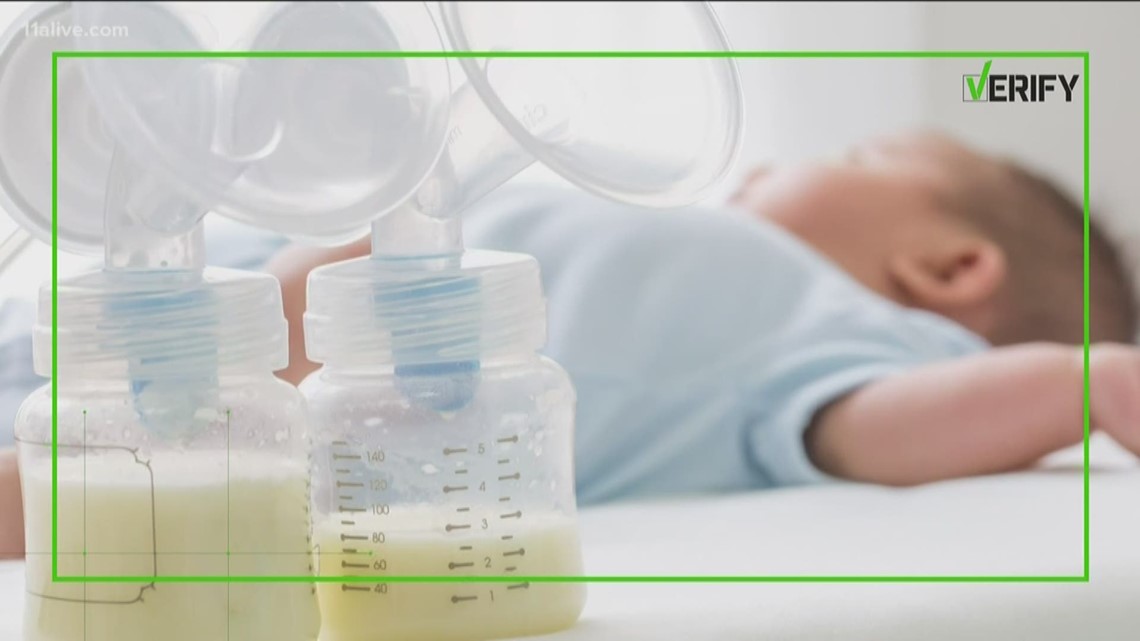ATLANTA — It's known as "liquid gold," and one mom's "life hack" for saving breast milk is getting huge reach online, touting the benefits of breast milk as a home remedy.
The post went viral in 2018, but it's back again, claiming one drop of breast milk contains one million white blood cells and that the liquid gold can treat issues ranging from diaper rash to cuts.
To verify the 'one million white blood cells' claim, we traced the information from the post to a 2010 blog, and ultimately, searched multiple scientific studies that have dissected the cellular composition of breast milk. Given none of the peer-reviewed studies accounted for one million white blood cells per mL, we asked 11Alive's Medical Correspondent Dr. Sujatha Reddy to verify what we know about breast milk.
"It's really nature's perfect food," Dr. Reddy confirmed, adding, "it's full of proteins and fats and special sugars."
The protective qualities of breast milk are particularly powerful days after a baby's birth, according to Dr. Reddy.
"We know in the first few days after a baby is born, the mom makes something called colostrum and that is full of antibodies," she said. "Over the next six to twelve months, the amount of antibodies varies based on mom's health and the baby's health."
"It's hard to say how many antibodies are in a particular drop of breast milk because of those variables...and these are antibodies not necessarily pure white blood cells," Dr. Reddy said.
After consulting multiple scientific studies and Dr. Reddy's expertise, we could not verify the claim that there are one million white blood cells per drop. But what about breast milk's use as a home remedy?
We turned to our second source, the Academy of American Pediatrics. In response to the post, the AAP sent us information from Dr. Lori Feldman-Winter, MD, MPH, FAAP, who chairs the AAP Section on Breastfeeding.
In reference to the post's claim about breast milk healing cuts, Dr. Feldman-Winter confirmed there is some evidence in the use of breast milk in the wound healing process.
"There is evidence for the use of human milk in epithelial regeneration for wound healing and corneal healing. I suspect it may be growth factors in human milk that contribute," she said in a statement.
While in response to claims breast milk can heal ear infections, Dr. Feldman-Winter said, "Breastfeeding prevents otitis media (ear infections) but most ear infections are in the middle ear. There is one case report of an adult woman with lymphoma and sinusitis being treated with donor human milk intra-nasally with positive results. This demonstrates the potential effects of human milk sIgA as an adjuvant therapy."
As for healing diaper rash, Dr. Feldman-Winter said such rashes can have multiple causes and whether breast milk would be effective in healing the rash would be dependent on the cause.
"The most common type of diaper rash is irritant dermatitis. Barrier creams may be as or more effective in these cases, and human milk may be more effective than mild steroid creams," she said. "But, when the rash is due to yeast (candida) the infection fighting potential of human milk may make the rash clear as fast or faster than creams. Diaper rash may also be a manifestation of atopic dermatitis, (eczema), or contact dermatitis, and in this case mild steroids, and limiting the potential offending agents plus or minus human milk offer good strategies."
The AAP did not address the other claims mentioned in the post, but Dr. Feldman-Winter said that breast milk has "properties beyond nutrition and many of the bio-active factors in human milk hold potential for healing."
"Given the multitude of bioactive factors in human milk there are many potential uses to heal and fight infection, however none are extensively studied. This is an area of new research," she said.
Ultimately, while breast milk could potentially treat some of these conditions, according to the AAP, current research does not fully back the viral claim yet.
"I don't think it's going to harm your child," Dr. Reddy said, "But I wouldn't do it instead of a prescription that's been given to you by a health care provider. or do it instead of going to the health care provider."

